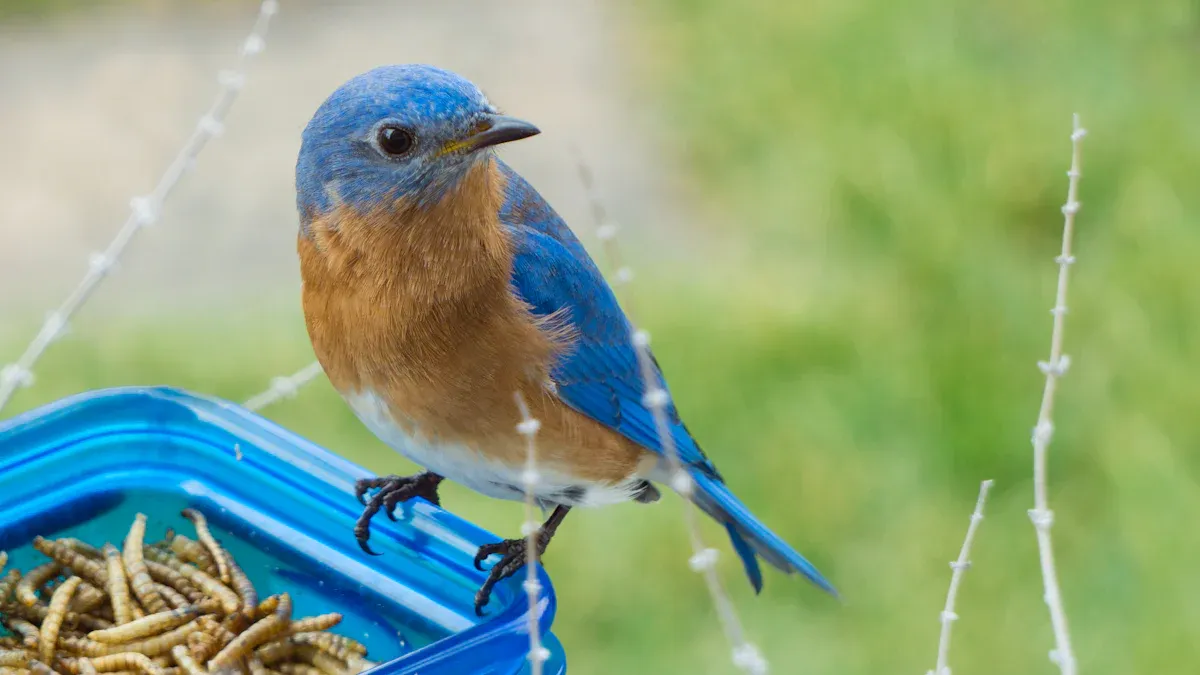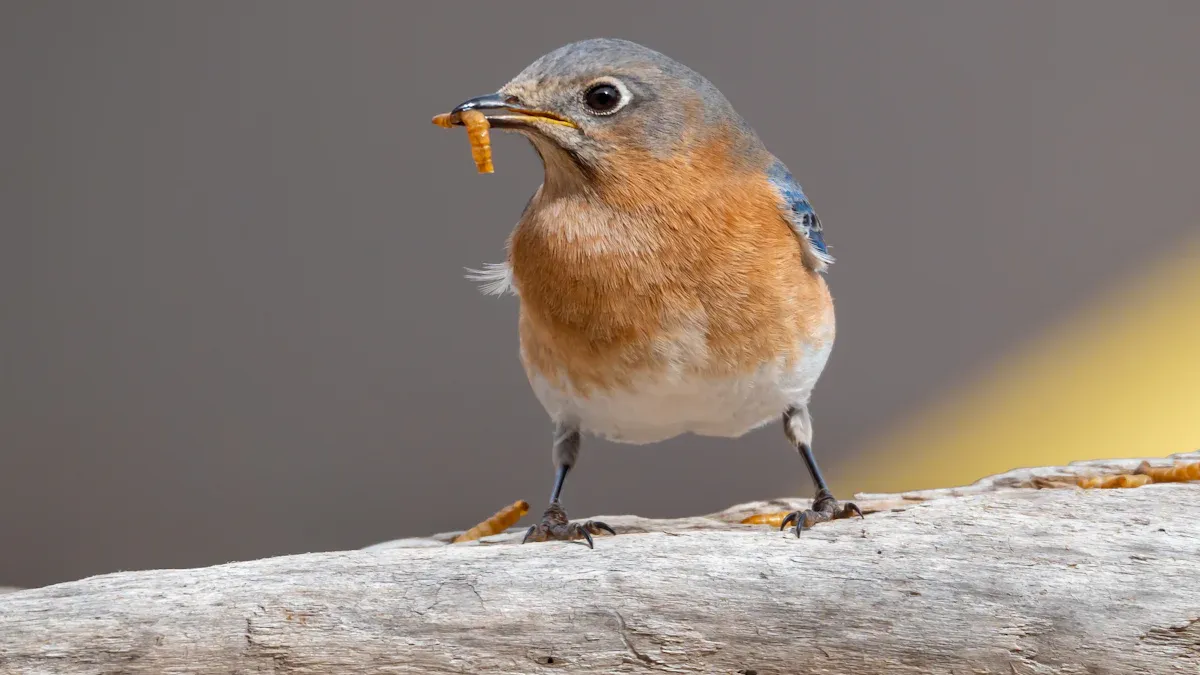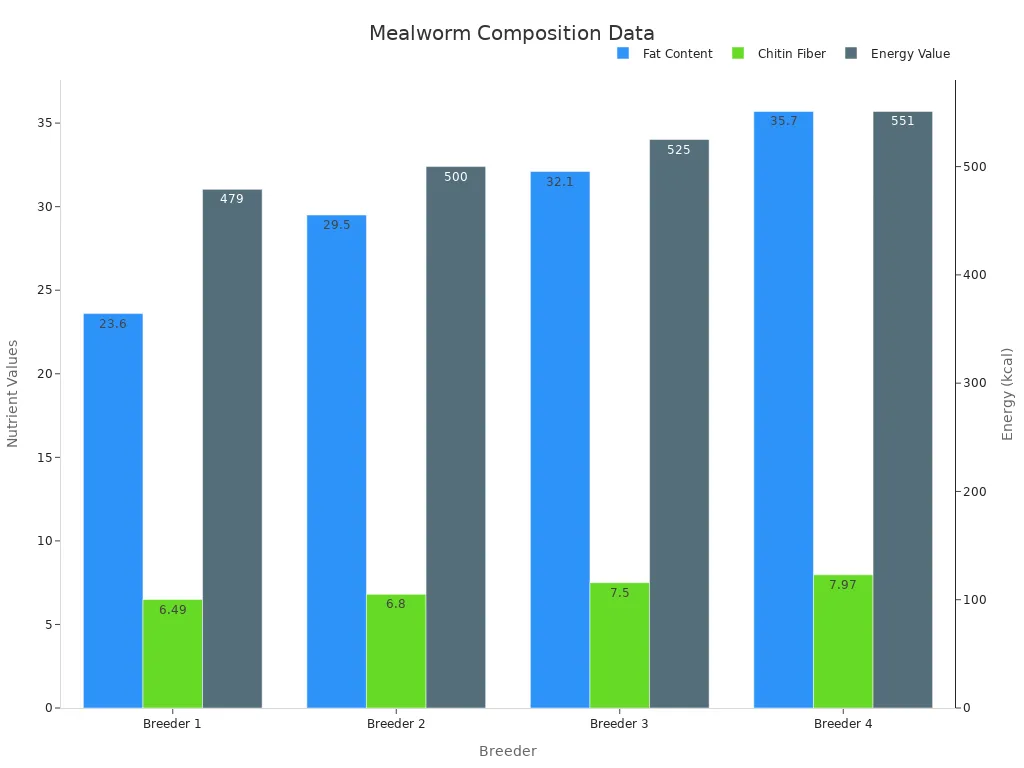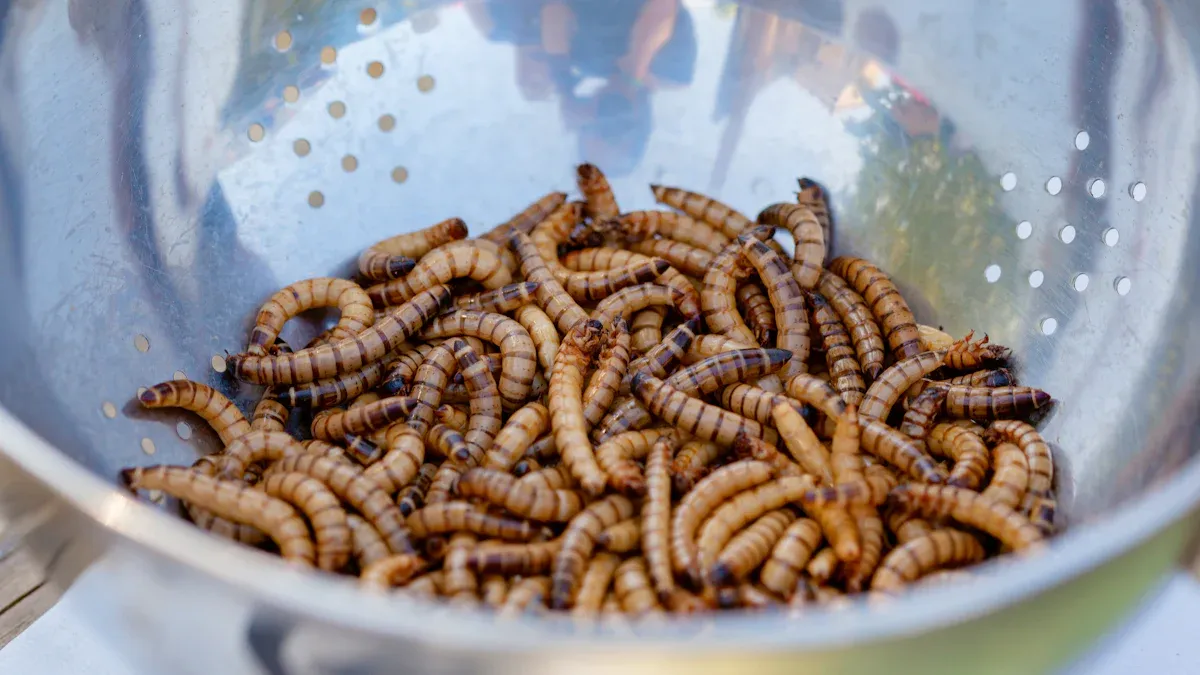
Mealworms for pets offer a powerhouse of nutrition. They deliver up to 57% protein and high healthy fat content, as shown below:
| Nutritional Property | Mealworm (%) |
|---|---|
| Crude Protein | 48–57 |
| Lipid Content | 32–40 |
These nutrients help pets build muscle, maintain energy, and support healthy skin and coats.
Key Takeaways
- Mealworms provide high-quality protein, healthy fats, fiber, vitamins, and minerals that support muscle growth, energy, skin health, and immunity in many pets.
- Dried mealworms are easy to store and feed, making them a convenient and nutritious treat for birds, reptiles, fish, and small mammals.
- Always buy mealworms from trusted sources and follow safe feeding and storage practices to ensure your pets get the best nutrition and stay healthy.
Nutritional Profile of Mealworms for Pets

High-Quality Protein and Essential Amino Acids
Mealworms for pets provide a rich source of protein that supports muscle growth and repair. Scientific studies show that mealworm larvae contain protein levels ranging from about 36% to 74% on a dry matter basis. Most commonly, when raised on commercial feeds like oats and wheat germ, their protein content sits between 63% and 69%. This high protein value makes them a great choice for pets that need extra nutrition, especially during growth or recovery.
Mealworms also offer a complete amino acid profile. They contain 14 amino acids, including all the essential ones such as lysine, leucine, threonine, and valine. Essential amino acids are important because pets cannot make them on their own. Instead, they must get these nutrients from their food. The total essential amino acid content in mealworms can reach up to 30%, depending on their diet. This means mealworms for pets can help meet the daily needs for strong muscles, healthy skin, and shiny coats.
Tip: Dried mealworms are easy to handle and store, making them a convenient protein boost for birds, reptiles, and small mammals.
Here is a table showing the protein and fat content of mealworms based on different diets:
| Nutritional Component | Range / Values | Notes |
|---|---|---|
| Protein Content (dry matter) | 47.9% to 53.4% | Highest in larvae fed wheat bran/flax cake |
| Crude Fat Content (dry matter) | 22.3% to 30.0% | Highest in larvae fed rye bran |
| Feed Conversion Ratio (FCR) dry matter basis | 2.01 to 2.52 | Lower FCR means better feed efficiency |
Healthy Fats, Fiber, and Energy
Mealworms for pets are not just about protein. They also supply healthy fats, which are important for energy and cell health. The fat content in mealworms ranges from about 23.6 to 35.7 grams per 100 grams of dry matter. This fat comes mostly from the larvae’s diet, so the exact amount can change depending on what they eat. Healthy fats help pets stay active and support brain function.
Fiber is another key part of the mealworm’s nutrition. The main fiber in mealworms is chitin, which comes from their outer shell. Chitin is partly digestible and acts as a prebiotic, supporting gut health in many animals. Mealworms contain between 6.5 and 8 grams of chitin per 100 grams of dry matter, which meets the EU’s claim for “High Fibre” foods.
Energy is also important for pets, especially those that are active or growing. Mealworms provide between 479 and 551 kilocalories per 100 grams of dry matter. This energy comes from a mix of protein, fat, and fiber, making mealworms a balanced food choice.

Note: The nutritional value of mealworms can change based on how they are raised and what they eat. Always choose high-quality dried mealworms for pets to ensure the best nutrition.
Key Vitamins and Minerals
Mealworms for pets also deliver important vitamins and minerals that support overall health. They contain calcium, phosphorus, sodium, potassium, magnesium, iron, zinc, and copper. These minerals help with bone strength, nerve function, and immune health.
Here is a table showing the mineral content of mealworms:
| Mineral | Content Range (Dry Matter Basis) |
|---|---|
| Calcium (%) | 0.04 – 0.50 |
| Phosphorus (%) | 0.70 – 1.04 |
| Sodium (%) | 0.11 – 0.36 |
| Potassium (%) | 0.74 – 0.95 |
| Magnesium (%) | 0.20 – 1.63 |
| Iron (mg/kg) | 63.0 – 100.02 |
| Zinc (mg/kg) | 102.0 – 117.40 |
| Copper (mg/kg) | 12.3 – 20.0 |
These nutrients are vital for pets at every stage of life. For example, iron supports healthy blood, while calcium and phosphorus help build strong bones and eggshells in birds. Zinc and copper play a role in immune health and skin condition.
Many garden birds, like robins, benefit from the extra protein and minerals in dried mealworms, especially during nesting season or cold winter months when natural food is scarce.
Mealworms for pets offer a complete package of protein, healthy fats, fiber, vitamins, and minerals. This makes them a smart and nutritious choice for a wide range of animals.
Health Benefits and Feeding Mealworms for Pets

Benefits for Birds, Reptiles, and Small Mammals
Mealworms for pets offer a tasty and nutritious treat for many animals. Birds, especially robins, love dried mealworms. These little insects help birds get the protein they need during busy times like nesting or cold winters. When natural bugs are hard to find, mealworms fill the gap. They support strong muscles, shiny feathers, and healthy eggs.
Reptiles, such as geckos and bearded dragons, also enjoy mealworms. The high protein and fat content help reptiles grow and stay active. Small mammals like hamsters and hedgehogs benefit from the extra energy and nutrients. Mealworms can be a fun snack or a reward during training.
Dried mealworms are easy to handle and store, making them a great choice for pet owners who want to avoid live insects.
Mealworms for Fish and Chickens
Fish and chickens both thrive on mealworms. These animals need high-quality protein and healthy fats to grow and stay healthy. Mealworm meal (MWM) works well in fish diets and shows great results in poultry, especially broiler chickens.
- Broilers eating mealworm meal gain more weight and grow faster.
- Chickens show better feed efficiency, meaning they need less food to grow.
- Mealworm meal matches or beats soybean meal and fishmeal in protein and amino acids.
- Chickens eating mealworm meal have healthier blood, with lower cholesterol and higher good cholesterol.
- Studies show better immune systems, stronger guts, and improved meat quality in chickens fed mealworm meal.
- Mealworm meal helps reduce harmful gut bacteria, making chickens healthier overall.
Fish also benefit from the rich protein and fat in mealworms. They grow well and stay active. Mealworms for pets can replace other protein sources without losing any nutrition.
Mealworms vs. Other Pet Foods and Treats
Mealworms for pets stand out when compared to other treats. Many pet foods use plant-based proteins, like soybean meal, or animal-based proteins, like fishmeal. Mealworms offer a complete protein with all essential amino acids. They also provide healthy fats, fiber, and important minerals.
| Feature | Mealworms | Soybean Meal | Fishmeal |
|---|---|---|---|
| Protein Quality | High | Moderate | High |
| Essential Amino Acids | Complete | Incomplete | Complete |
| Healthy Fats | Yes | Low | Yes |
| Fiber | Yes | Yes | No |
| Easy to Store | Yes | Yes | No |
Dried mealworms are a healthier alternative to bread for feeding wild birds and ducks. They do not contain empty calories and provide real nutrition.
Safe Feeding Guidelines and Preparation Tips
Feeding mealworms safely is important for your pet’s health. Follow these steps to prepare mealworms for pets:
- Choose healthy mealworms and let them warm up before feeding.
- Gut-load mealworms with nutrient-rich foods, like leafy greens, for 24-48 hours.
- Dust mealworms with calcium powder to boost nutrition.
- Keep their habitat clean by removing old food and waste.
- For humane feeding, freeze mealworms for at least 24 hours.
- Optionally, boil mealworms to remove dirt and parasites.
- Store mealworms in the fridge at 45°F to 50°F for short-term use.
Always wash your hands after handling mealworms or their containers.
Sourcing, Storage, and Safety Considerations
Choosing the right source for mealworms matters. The European Food Safety Authority (EFSA) confirms that dried and frozen yellow mealworms are safe as pet food when produced under strict standards. These rules make sure mealworms meet high safety and quality requirements.
Experts recommend buying mealworms from trusted suppliers. This ensures your pets get safe, high-quality food. Always check with a vet or pet expert to find the right amount for your animal’s age and species.
Proper storage keeps mealworms fresh and nutritious. Studies show that mealworms grown at the right temperature reach full size quickly and keep their protein and fat content. Store dried mealworms in a cool, dry place, and use them before the expiration date for best results.
Dried mealworms are a convenient, safe, and healthy choice for many pets. They offer all the protein without the wriggle, making them perfect for pet owners who prefer not to handle live insects.
Mealworms for pets offer a sustainable, nutrient-rich food choice for many animals. Their protein, healthy fats, and vitamins support growth and health. The table below shows their nutritional power:
| Nutrient | Benefit |
|---|---|
| Protein (50%) | Muscle, growth |
| Fat (30%) | Energy, skin health |
| Minerals | Bones, immunity |
| Vitamins | Vitality, wellness |
Choose trusted sources and safe feeding practices to unlock these benefits for your pets.
Article author: Felix
FAQ
Can all pets eat dried mealworms?
Most birds, reptiles, fish, and small mammals enjoy dried mealworms. Always check with a vet before adding new foods to a pet’s diet.
Tip: Robins and garden birds love dried mealworms!
How should someone store dried mealworms?
Store dried mealworms in a cool, dry place. Use an airtight container. This keeps them fresh and tasty for pets.
Are dried mealworms safe for wild birds?
Yes! Dried mealworms are safe and healthy for wild birds. They offer protein and energy, especially during nesting or cold weather.


